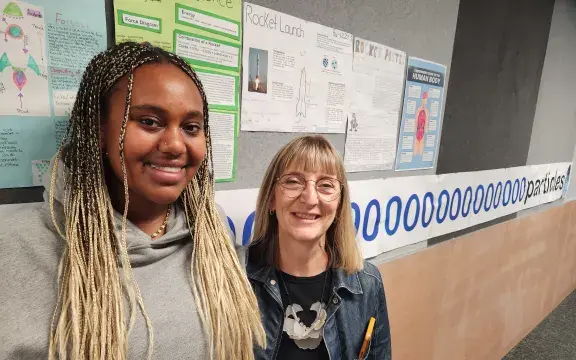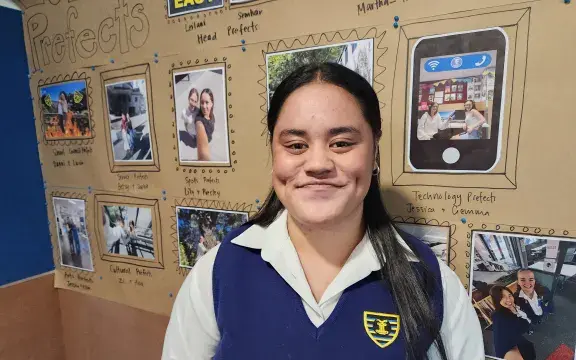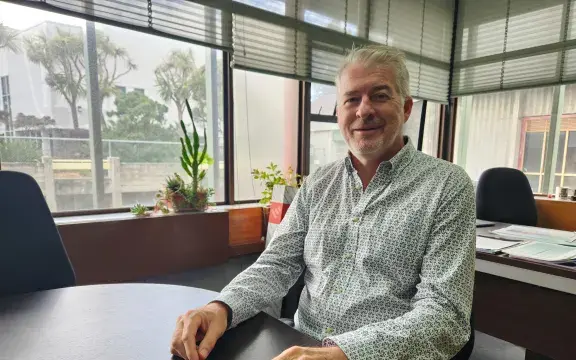School phone ban: 'Students seem to be okay with it'
RNZ
07 February 2024, 6:37 PM
 Students will be banned from using a phone at school, including during lunch-time and breaks, though there are exemptions. from the start of term two. File photo. Photo: lev dolgachov
Students will be banned from using a phone at school, including during lunch-time and breaks, though there are exemptions. from the start of term two. File photo. Photo: lev dolgachovJohn Gerritsen, Reporter
Schools have been open for just a few days, but many have already adopted the government's ban on mobile phones before it comes into force at the start of term two.
From term two schools must ensure students do not use a phone at school, including during lunch-time and breaks, although there are exemptions.
Wellington teenager Nina told RNZ the phone ban did not go down well when her school announced students must keep their phones switched off and in their bags all day.
"I think most people were pretty disappointed when they announced in assembly, you could just feel the energy going," she said.
"Kids are going to start using their computers as they would their phones. You can access a lot of Snapchat, everything... I think it's a bit pointless."

Wellington East Girls College student Semhar Girmay and principal Gael Ashworth. Photo: John Gerritsen
Wellington East Girls College student Semhar Girmay was more positive about her school's policy, which also required students to store their turned-off phones in their bags.
"When we first got the email I ran to my parents and was like 'what am I going to do, I can't do this'," she said.
However she said she was already paying more attention to school notices and concentrating better in lessons without her phone distracting her.
"I'm not fully used to it, I still catch myself walking into school with it in my pocket, but I think with time it's actually fine."
Fellow Wellington East student Seralina Seumanufagai said she initially thought the ban was a bit extreme and she found the first few days difficult.
"Usually the first thing I do when I get to school is text my friends 'where are you, what time are you coming', so now it's been kind of hard, we've been trying to memorise each other's timetables, walking around the whole school trying to look for each other. But I think as time goes on and by next term everyone will get used to it and all the upset students will calm down."

Wellington East student Seralina Seumanufagai Photo: John Gerritsen
The school's Year 9 Dean Shelley Vail said she had already noticed positive changes.
"I have seen no cellphones in class at all or walking around school on duty. A couple of behaviours I have seen that have changed is I've seen more students engaged in game-playing, things like playing cards, and we cycled all the Year 9s through the library as part of their orientation programme and the librarians have been thrilled with the number of books students are taking out and have noticed students are reading in the library much more than they noticed last year," she said.

Wellington East Girls College Year 9 dean Shelley Vail Photo: RNZ
School principal Gael Ashworth said previously the school expected students to keep their phones turned off in their bags "but that wasn't the reality".
"We've only had two days where we've had the whole school back and the numbers of cellphones that we've had surrendered to staff have been quite low," she said.
"Students seem to be okay with it. Anecdotally, my take on wandering around the school is there is a lot more face-to-face engagement between the students. Young people playing cards and chatting."
Nearby, Wellington High School is still figuring how it will implement the government's policy and students are considering what it will mean.
Some told RNZ the ban would reduce distractions in the classroom and encourage socialising during breaks though one student said they wanted to play games on their phone at lunchtime.

Wellington High School principal Dominic Killalea. Photo: John Gerritsen
Principal Dominic Killalea said the school already expected students to keep phones away during lessons.
He said it would not stop young people misusing social media in their spare time and it might make it tricker to use phones for learning.
"I've had a number of teachers come to me and talk about the particular applications that they use with mobile technology," he said, such as students using their phones to photograph plants on the school grounds for a biology lesson.
"The policy isn't saying that you can't do that. However it is just a little more difficult when that teacher says 'okay, you all have to bring your phones in tomorrow'," he said.
Killalea said the school would consult with students and their families and was likely to suggest a policy that allowed students to keep their phones in their bags, but switched off.
South Wellington Intermediate School principal Toby Stokes said it banned mobile phones four years ago, so the government's policy was nothing new for his school.
"The students walk in the door. They're allowed their phones at school until the bell goes. Then they need to be locked up for safe-keeping and then they get given the phones back at the end of the day. If they are needed for classwork then they're monitored but then put away again," he said.
Stokes said a ban on phones was not hard to enforce and the school only encountered one or two students who desperately tried to hang on to their phones.
"We wanted our students to be active participants in their learning and active in the playground as well," he said.
Secondary Principals Association president Vaughan Couillault said he expected most schools had started the year with policies that met the government's requirements rather than trying to change their rules part-way through the year.
He said it might be difficult to enforce the policy during breaks and it could lead to problems if expensive phones were confiscated and subsequently lost or damaged.
This story was originally published by RNZ



